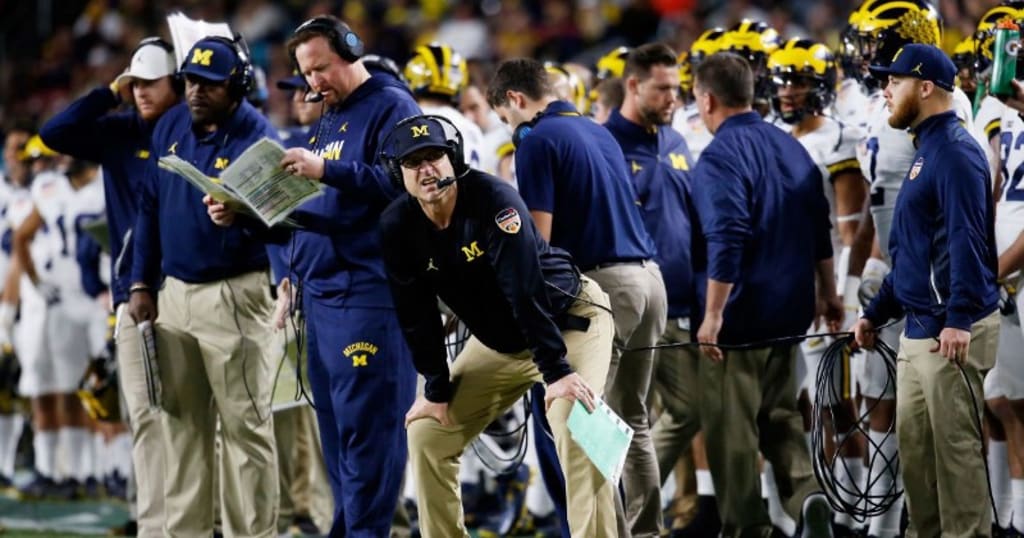Making a Case for an 8-Team College Football Playoff
The debate of 4 vs. 8 continues.

To begin, I must note an author disclaimer. In no way, shape, or form am I suggesting my personal beliefs about the system of the College Football Playoff. I am simply making a case for something different. With this in mind, let’s begin.
The Plan
In order for an idea to become realistic, a plan must be formulated. Luckily, I have outlined a plan that could work for the coaches, players, and fans. Is this plan flawless? No. However, all great things start with a simple idea.
Conference Champions
All conference champions in the Power 5 deserve a shot at contending for the national title. In some cases, such as in 2016, conference champions are left out of the CFP equation. Instead of Big 10 champion Penn State being granted a spot in the playoff, Ohio State (a team that Penn State defeated) was granted the #3 seed by the playoff committee. Ohio State went on to get routed by the ACC champion Clemson Tigers 31–0 in the Fiesta Bowl. In this new format, teams such as Penn State will never be left out. The Big 10 was seen as the best conference in college football this season. It only makes sense to reward the team that beats the likes of Ohio State and Wisconsin, regardless of who they lost to or what the margin of defeat was. No matter how a good/bad a conference is, each of their champions deserve to represent the conference on College Football’s biggest stage. There are some conferences (hello, Big 12) that contain a system which allows 2 teams to play each other twice in one season — once in the regular season, and once in the conference championship game. To some fans, this is not fair. “We’ve already beaten them once, so why should we have to beat them again?” When answering this question, I’m reminded of a quote by future NBA Hall of Famer Ray Allen: “Bad teams find a way to lose. Great teams find a way to win.”
Two “Sleepers”
Every year, there are 1 or 2 teams that are considered the best in the country, but fail to win their conference. This year, those 2 teams were Ohio State and Michigan. Unfortunately, these two met as the #2 and #3 teams in the country before the committee decided which teams were in. Michigan lost a nail biter that was hailed the best game of the 2016 season, until the National Championship was played last night. The problem for Michigan? The loss to Ohio State was their second loss of the season. Although Michigan’s record did not indicate a playoff-level team, their Big 10 resumé did. The Wolverines were one play away from the playoff, and are arguably a better team than both Ohio State and Washington. With the addition of 2 deserving teams who did not win their conference, the new playoff would be bound to have several spectacular endings.
Group of Five Champion
Even though there can never be a true “champion” of the group of 5 conferences, the team with the best record within these conferences certainly deserves a shot at college football’s biggest honor. The lingering question is: could the FBS teams that face lesser talent keep up with the remaining FBS teams? This year, PJ Fleck and Western Michigan held their own against Wisconsin. In 2015, Tom Herman’s Houston squad could have played with almost anyone. Just ask Florida State how the Peach Bowl went that year. There are certainly some other questions requiring answers. Would the group of five ‘champions’ always be the #8 seed, having to play the #1 seed? Could there be bye weeks for 1 or 2 teams, allowing the group of 5 participants an ‘easier’ opponent? There is simply not enough information to determine the answers at this time. One thing we do know is this — an 8 team playoff system could logistically work. However, is it what college football needs?
The Pros
With every argument, there are several pros and cons that accompany it. First, let’s start with the positive impact an 8 team playoff would have:
- No ‘deserving’ team is left out. With the inclusion of all Power 5 conference champions, the group of 5 champion, and 2 additional Power 5 teams that are viewed as elite enough to compete in the playoff, there is no longer any room for the “my team was good enough but left out” argument.
- Expanding the College Football Playoff to 8 teams equals more games. More games equals more revenue for the NCAA. More revenue for the NCAA equals more money for the schools that participate in the playoff. This trickle down effect of revenue generated by an extended playoff benefits everyone involved.
- Fans get to watch more football. Need I say more?
- Under the 4-team playoff, teams that reach the National Championship game play a 15 game season. With an expanded 8 teams, those reaching the championship will play 16 games in one season. The benefits to this? Players from these respective teams that move on to the NFL will be better prepared for the grueling schedule that comes with being a professional football player. In yesterday’s National Championship Game, there were at least 10 players that will be drafted in the 2017 NFL draft. Between both Alabama and Clemson’s rosters, there could be over 50 players that move on to the NFL.
The Cons
Not every argument can be full of rainbows and butterflies. There are some parts to this argument that we must be realistic about:
- More games enhances the risk of injury — just ask Alabama RB Bo Scarbrough. Careers can be ended, and NFL prospects can lose millions of dollars due to an injury suffered in one extra game.
- The recruiting dead period set by the NCAA usually ends around January 12th. With an additional game added to the playoff schedule, it seems likely that these games and recruiting could overlap. Will coaches that make it to the championship ever get to sit down and relax after a year full of tireless work? Do head coaches in college football ever get to relax? Probably not. However, an extended playoff puts coaches that make it to the final game at a disadvantage. While other coaches are at home relaxing and nonchalantly outlining their recruiting plans, 2 coaches are focusing on winning a national championship. This seems like an unfair advantage for coaches that did not perform at the highest level. Many say that competing in a national championship allows recruiting to take care of itself. More often than not, this theory reigns true. Therefore, a question must be posed: do coaches that under-perform in this new system receive an unfair advantage, or simply a head start to help them better compete?
- Not everyone wants to watch more football. For those that hate football, this is for you (although I question your sanity).
- Several institutions and people would benefit from an extended playoff monetarily — the broadcast networks, the NCAA, the universities, and the coaches. But what about the players? Without the players, how much money do these other entities make? Not much. Yet, the players only form of payment is a free education. Don’t get me wrong, I would love to receive a free college education. The fact of the matter is, most football players do not come to college to get an education. They come to play football. Therefore, how can the pros outweigh the cons for these athletes that receive no compensation for their hard work? They can’t.
The College Football Playoff has produced exciting games since it originated in 2014. Thus far, the 4-team playoff system has not disappointed. Is it possible for the playoff to move from 4 to 8 teams? Yes. Is the plan outlined achievable? Yes. Is it logical? I don’t know. One thing I do know is there are too many deserving teams left out of the playoff each year. Who knows — the 4-team system may be the best thing to ever happen to college football. I just couldn’t sit back and let the Penn States, Michigans, and Houstons of college football remain unnoticed.
About the Creator
Harrison Wier
CEO of The Unbalanced. Law student. Sad Houston sports fan.






Comments
There are no comments for this story
Be the first to respond and start the conversation.